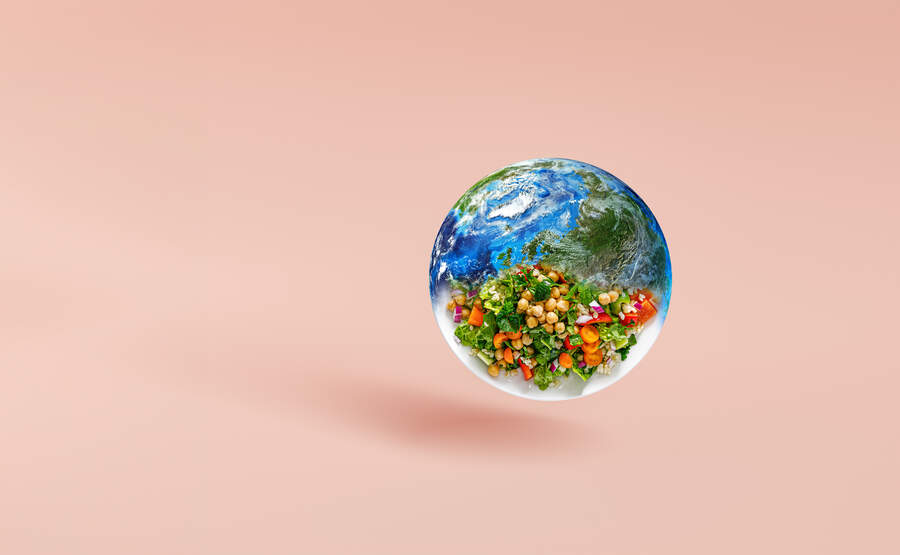
We all want to do our bit to combat the climate crisis, and choosing greener foods is one small step that can make a signifi cant diff erence. Eating sustainably is key to mitigating global warming and averting climate change, since one third of global greenhouse gas emissions come from the food system. Of all the freshwater used by humans, 70% goes to agriculture. Food production is also the leading cause of deforestation, biodiversity loss, and soil and water pollution. There are ever more mouths to feed – according to the UN, food production may struggle to meet the demands of the global population by 2050.
As cyclists, we have big appetites, and that’s even more reason to slow our consumption of the earth’s resources. The good news is that small changes can make a big difference to our planet. With this in mind, we’ve compiled eight ways to make your diet more sustainable.
Eat less meat and dairy
73% of deforestation and land conversion caused by agriculture
35% of global fish stocks have been overfished to unsustainable levels
33% of all food produced is wasted – either lost in the supply chain or thrown away
30% lower greenhouse gas emissions from a plant-based diet
60% of UK food waste is from domestic homes
£83 per month average saving for a UK family minimising food waste (about £1,000 a year)
30% of the earth’s land surface used for livestock farming
15,000 litres of water required to produce 1kg of beef
Farming animals for meat and dairy products uses up vast amounts of land, water and animal feed. It is hugely inefficient and thought to be responsible for nearly 15% of all manmade greenhouse gas emissions. This is largely due to land clearing, including deforestation to create more pasture and grow feed for livestock. And with global meat consumption having soared by 500% between 1992 and 2016, one of the most effective things you can do is to moderate or reduce your consumption of animal products and eat more plant protein.
One pro team making an effort to fuel its riders more sustainably is second-tier Swiss outfit Q36.5. “I educate our riders that eating large portions of meat isn’t a good idea,” says the team’s nutritionist Adam Plucinski. “I also encourage them to replace animal protein with plant protein as often as possible. Thanks to our amazing team chef Peter Nierinckx, our buffet always contains plant sources of protein. These include various types of legumes, beans, hummus and tofu.” Steaks are off the menu. “We try to keep the amount of red meat, such as beef, to a minimum. Partly because it is difficult to digest – during a stage race, dinner is often eaten quite late – and partly because beef is the most burdensome type of meat for the environment.”
Eating more plant-based protein is good for your health, providing fibre, vitamins and antioxidants as well as being lower in saturated fat. Vegetarians have been shown to have lower rates of heart disease, hypertension, diabetes and obesity. Plant foods also promote a healthy, more diverse gut microbiome, since the good bacteria in your gut feed off fibre and polyphenols.
A big concern among cyclists is that plant sources might not provide enough protein, but this needn’t be an issue provided you consume some plant protein at every meal. “Try to get your protein from as wide a variety of foods as possible,” advises Plucinski. “At Q36.5 we provide riders with multiple protein sources to ensure a full profi le of amino acids while limiting the consumption of meat. It’s certainly not a limiting factor for performance or recovery.” For example, rice and beans are a classic combination to deliver a full balance of essential amino acids. Other plant based protein sources include tofu, tempeh, quinoa, buckwheat and soya milk, which provide all nine essential amino acids, and you should include beans and lentils more often – think bean burritos and burgers, hummus, bean stews, lentil curries and dahls, and bean chilli.
If the idea of going vegan or vegetarian seems daunting, it’s worth remembering that it doesn’t have to be an all-or-nothing change. Adopting a fl exitarian diet can significantly reduce your meat intake. Research shows that if every UK household replaced a red meat meal with a plant based meal just once a week, it would have an environmental benefit equivalent to taking 16 million cars off the road – a big difference from a small change. An easy way to cut back on your meat consumption is by adopting meatless Mondays, or having a few days of meat-free meals per week. Replacing some (or all) of the meat in casseroles, curries and the like with beans and lentils will help to make your diet more sustainable – and you’ll save money too.
Reduce your food waste
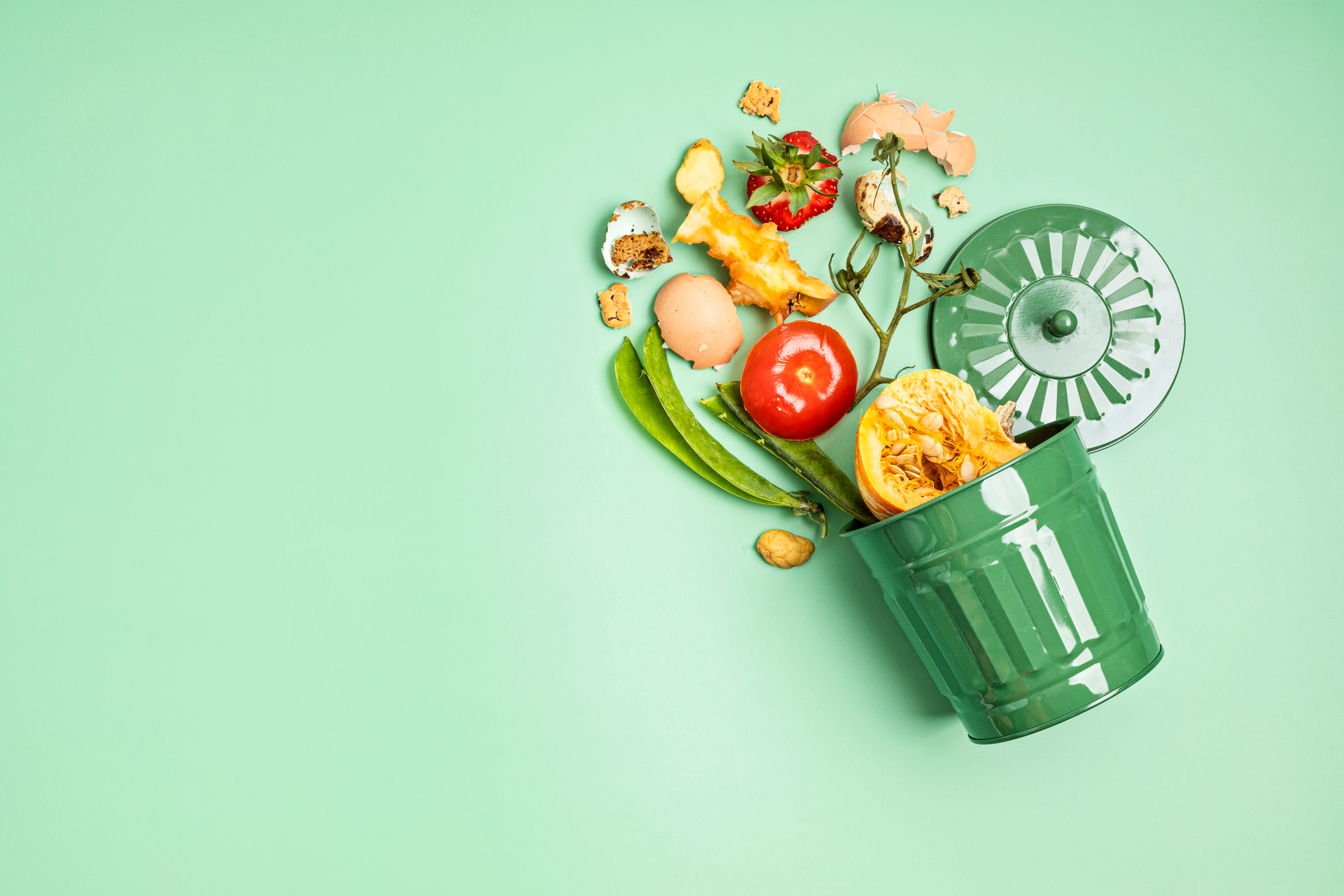
One third of all food produced is either lost or wasted. That’s 1.3 billion tonnes of food, costing the global economy £720 billion each year. Between 30 and 40% of edible food ends up in landfi ll, where it rots and releases methane, which accounts for 12% of all global greenhouse emissions. According to UK charity Wrap, the average person in the UK wastes around 95kg of food per year, equivalent to £250. The top three most wasted food items are fruit, vegetables and bread.
Q36.5 has a policy for recycling waste at races with foldable bins for easy sorting and disposal. “We limit the team’s food waste to zero,” says Plucinski. “For example, unused food from breakfast, like oatmeal, can be made into porridge cake. Anything left from dinner is used for staff lunches the next day.”
To cut your food waste, schedule a weekly ‘use it up’ meal to make the most of leftover ingredients. Make a shopping list and resist the temptation of bulk promotions and buying more than you need. A good tip is to freeze anything that you can’t eat while it’s fresh. Measure portion sizes for foods like rice and pasta, and if you have leftovers, eat them for lunch the next day. Use the whole plant wherever possible; for example, add chopped broccoli stalks to curries or soups; use overripe fruit in smoothies, and turn leftover bread into croutons. Compost any remaining food waste and inedible parts. Your local authority might provide free food waste caddies and collections for households, but it’s also easy to compost at home.
Cut back on plastics
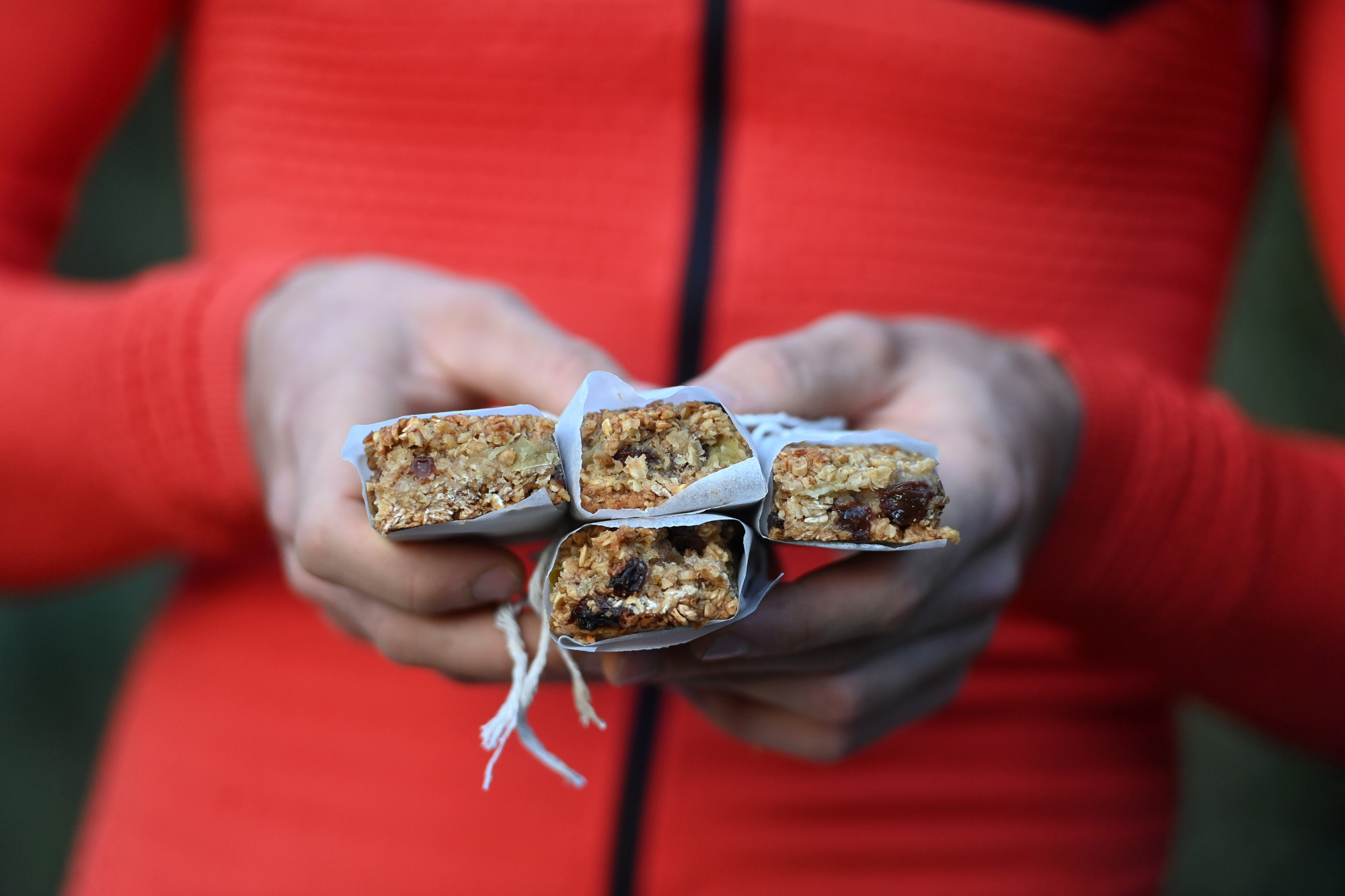
Reducing single-use plastics and using eco-friendly packaging can make a big difference. Plastic pollution contributes to the climate crisis, harms wildlife, endangers public health, and is a leading cause of land, water and air pollution. Each year around eight million tonnes of plastic ends up in our oceans.
Easy ways to ditch plastics include using reusable coffee cups and bottles, buying loose fruit and vegetables instead of plastic-wrapped, not using plastic cutlery or straws, and using beeswax wraps instead of cling film (available from Amazon and large supermarkets). “Q36.5 have stopped using disposable plastic products, such as cups, cutlery and plates and replaced them with sustainable and eco-friendly alternatives,” says Plucinski. “We have also replaced plastic wrap and foil with paper bags for lunches and sandwiches.”
More and more sports nutrition brands are ditching plastics too. For example, Tribe use biodegradable home-compostable wrappers for their energy bars while Lucho Dillitos’ blocks come wrapped in a dried bijao leaf – the ultimate in compostable packaging. Kendal Mint, Active Root and High Five sell bulk refillable gels that you decant into a reusable gel flask.
If you want to take sustainability a step further, make your own snacks at home. Energy bars or balls made with dried fruit, nuts and seeds make a tasty change from pre-packaged foods during long rides and save money too (see ‘Chocolate Energy Bars’ below).
Reuse water bottles
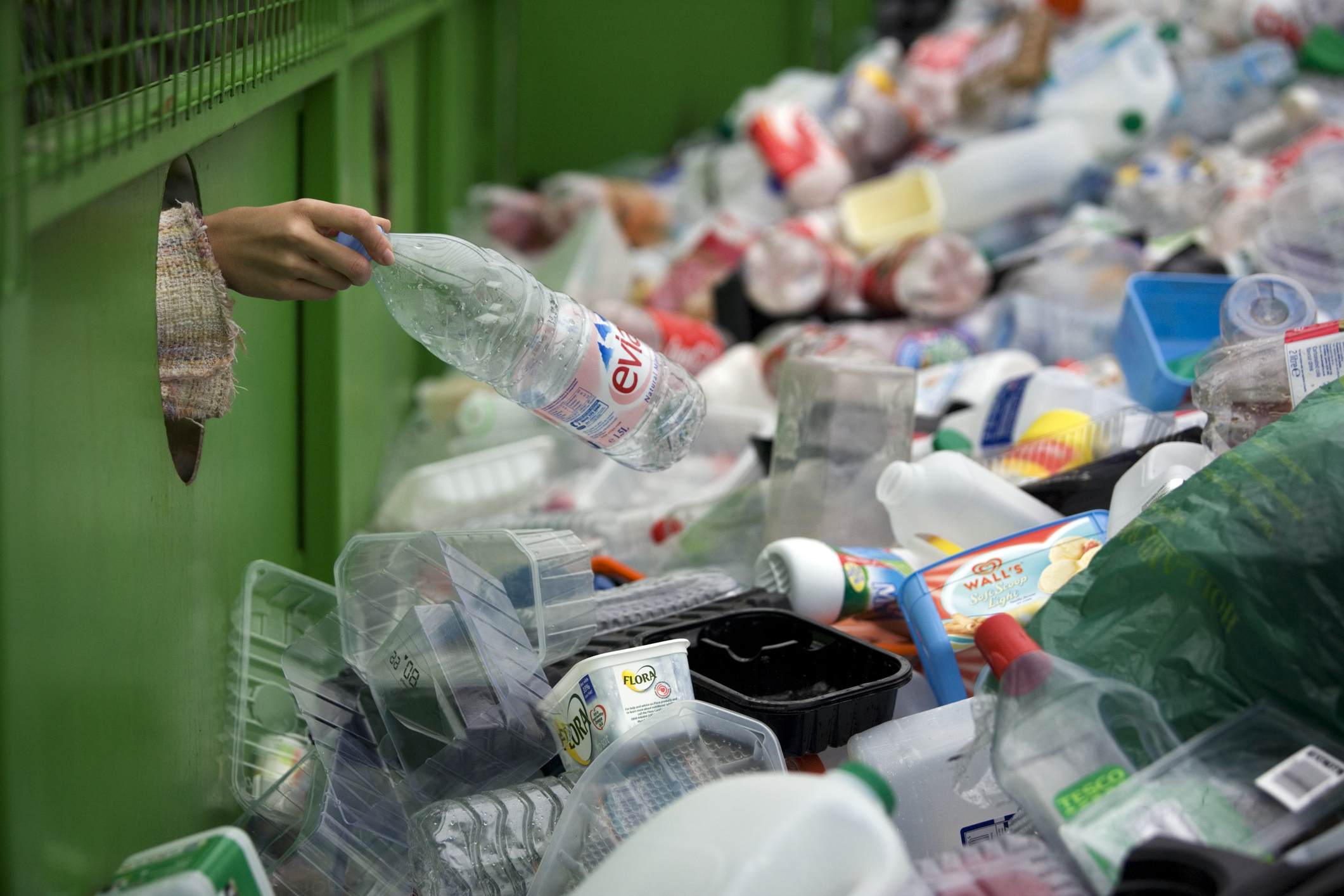
Plastic bottles are one of the biggest pollutants on earth, contributing significantly to the global plastic pollution crisis. Producing a single plastic bottle requires around three litres of water, 0.5kWh of electricity, and emits 5g of CO2 for every 1g of PET used.
Q36.5 has a reusable bottle policy that entails each team member bringing their personal reusable bottle to races. “These can be refi lled in designated areas, reducing plastic waste,” explains Plucinski. The team estimates it saved €2,000 in bottle costs at a recent 11-day training camp, using just 400 bidons for 27 riders – compared to the 1,782 disposable bottles they would have used if following traditional practice.
Grow your own
Home-grown fruit and vegetables are free of the carbon footprint that comes with shop-bought food. They also tend to be more nutritious, as unlike shop-bought products they are grown organically and don’t need to be stored or transported; there are no food miles involved, no packaging, and no harmful chemicals needed.
Being part of the planting and growing process of food can also benefit your gut health, as in handling soil we absorb beneficial microbes. Not to mention the sense of achievement in growing your own food, which means you’re less likely to throw it away and more likely to eat it.
If you don’t have a garden, try growing herbs and cress on windowsills, patios or balconies. Start with a herb pot on your patio and progress overtime – each plant will be one less thing you need to buy in the supermarket.
Buy local and seasonal
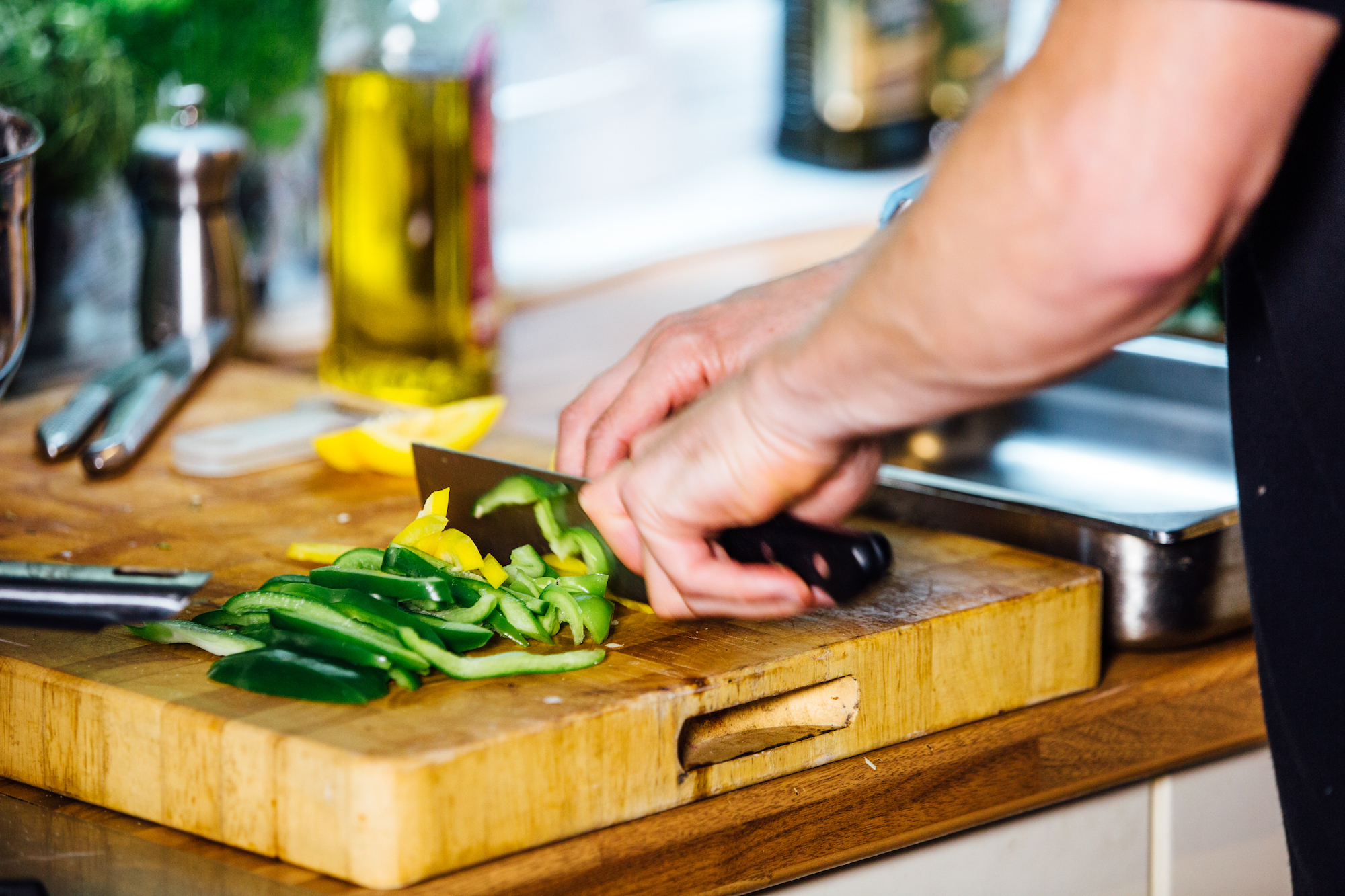
When you buy food from local suppliers, it is transported fewer miles, meaning lower carbon emissions. It also means you’re getting fresher food. You can use the National Farmers Union (NFU) chart to find out which British fruit and vegetables are currently in season and available to buy in the shops. Eating seasonal produce can also save you money because you are buying locally grown produce at its most naturally abundant time. Try to source products from local markets or community co-ops or check labels in supermarkets to fi nd the country of origin.
Check the logos
There are various logos you can look out for to ensure that the food you buy is sourced and produced in a sustainable way. Fairtrade shows that products meet international fairtrade standards that protect farmers and workers in developing countries; the Freedom Food logo indicates that products come from animals that have been inspected to higher welfare standards; the RSPO (Roundtable on Sustainable Palm Oil) logo signifi es the use of sustainably sourced palm oil; the LEAF (Linking Environment and Farming) marque means products have been grown sustainably and with care for the environment; and the MSC (Marine Stewardship Council) label is a symbol of sustainability to prevent overfi shing.
Choose unprocessed

The more steps involved in food production, the higher the carbon emissions from transportation, manufacturing, and distribution. Processed foods also tend to use more packaging, which ends up in landfill. For example, a protein bar or powder with a long list of ingredients will have a higher carbon footprint than a handful of nuts, which comes from one food source with minimal processing.
Wrapper free bars
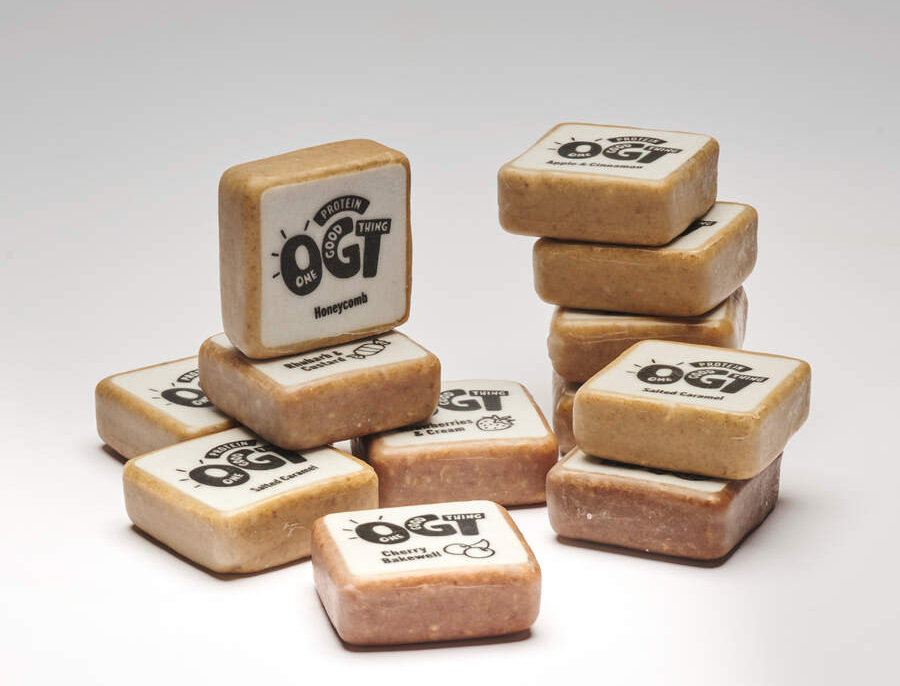
CW recently taste-tested One Good Thing (OGT) wrapper-free oat and protein bars. They are covered in an edible beeswax coating, doing away with the hassle of wrappers on a ride completely. “Seeing the countryside strewn with plastic wrappers, my father Mike Bedford and I wanted to create a wrapper-free oat bar to revolutionise convenience for cyclists,” explained co-founder and CEO Daniel Bedford. “Our innovation doesn’t just reduce plastic waste – it removes it entirely, helping keep our beloved cycle routes completely free of litter.” Having tried the bars, we’re very impressed. Not only do they hold up well in a jersey pocket, they’re also easy to eat, and taste great – the carob and orange fl avour is a particular favourite. More details: weareogt.com
Make your own chocolate energy bars
You will need...
- 75g oats
- 75g mixture of sunflower and pumpkin seeds
- 10 pitted Medjool or soft dates (180g)
- 1 ½ tbsp cacao or cocoa powder
- 1 tbsp honey or maple syrup
- 1 tbsp peanut butter
- 75g dark chocolate chips (or chopped dark chocolate)
- 3 tbsp water
Method
- Place the oats in the bowl of a food processor and pulse a few times until finely ground.
- Add the seeds, dates, cacao powder, honey and peanut butter and pulse until the mixture starts to clump together. Add the water and chocolate chips and pulse again.
- Turn the mixture out and press or roll between two sheets of baking paper to 1cm thickness. Cut into eight bars. Alternatively, roll into bitesize balls. Store in the fridge for up to fi ve days.
- To take on a ride, wrap in aluminium foil (clean it and scrunch it in a ball before putting in the recycling bin) or beeswax wrap.
This article was originally published in Cycling Weekly magazine. Subscribe now and never miss an issue.


.png?w=600)




